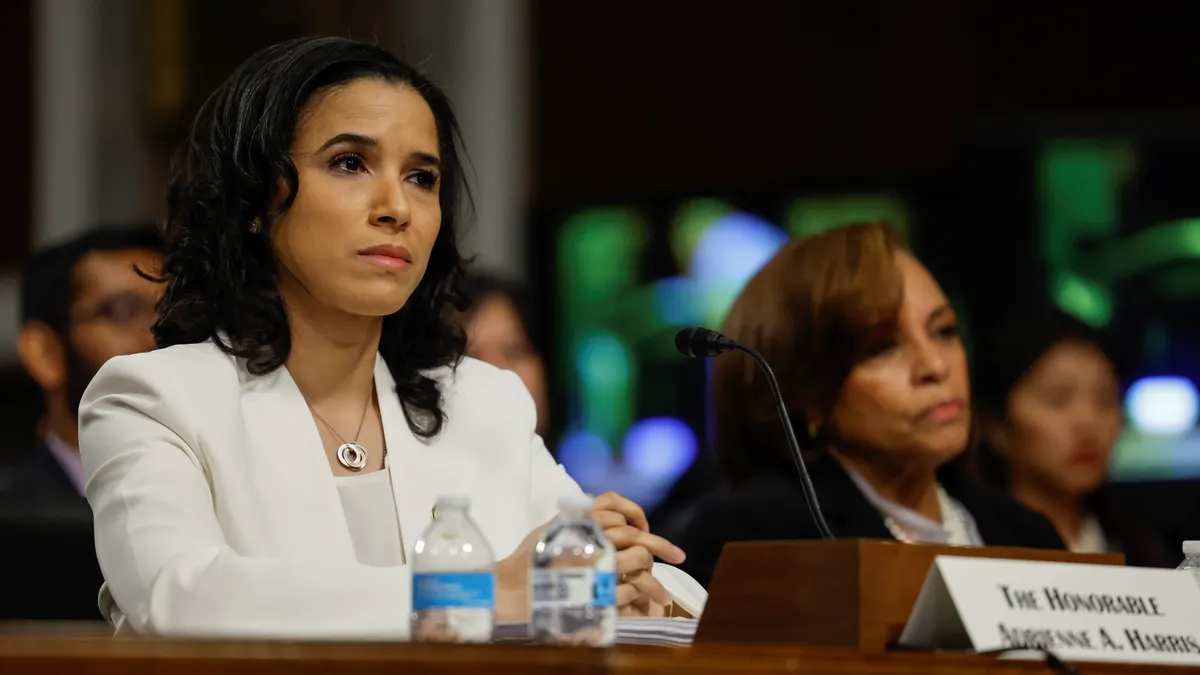Dive Brief:
- Adrienne Harris, the superintendent of New York’s Department of Financial Services, is leaving the agency, Gov. Kathy Hochul said in a release Monday.
- Kaitlin Asrow, who leads the regulator’s research and innovation division, will serve as acting superintendent beginning Oct. 18, according to the release.
- Harris, a former Obama staffer, began in her role in January 2022, after being nominated the previous August. In an interview with the Financial Times, Harris said she had always planned to step down after four years. Her departure from NYDFS has “nothing to do with anything else going on in the country or in politics — zero,” she told the publication.
Dive Insight:
Under Harris, among other actions, NYDFS closed Signature Bank in 2023 – in what has become the fourth-largest bank failure in U.S. history.
Signature’s failure, alongside that of Silicon Valley Bank and later First Republic, demonstrated a need for bank examiners to be able to more clearly spotlight banks’ weaknesses to preempt a potential crisis, Harris said.
“What we saw with all the banks that failed that weekend, including Signature, is they all had persistent threes, at least, in critical areas like liquidity risk management,” she said, referencing the banks’ CAMELS rating on a scale of 1 to 5.
“If you had a kid who was getting Cs in math semester after semester, you would have some sort of intervention,” Harris said in March during a conversation at the Brookings Institution.
For banks habitually receiving substandard ratings, NYDFS needed “a process by which the examination staff will escalate that issue to executive management, and then a determination has to be made: Do we need an interim exam? Do we need a [memorandum of understanding]? Do we need a consent order?” she said. “If those issues aren’t bubbling up, we can’t take proper action.”
During her tenure, Harris also arguably kept a strong focus on the burgeoning cryptocurrency space – pushing banks supervised by the agency to ask for prior approval before engaging in any crypto-related activities. Under Harris, the agency also proposed a measure to bill state-licensed crypto businesses for costs related to supervision and exams.
The NYDFS, under Harris, fined crypto firms such as Paxos, Coinbase and Robinhood tens of millions of dollars each and prioritized guidance to keep banks clear of money laundering and sanctions violations. That included directing banks this month to use blockchain analytics tools if they’re considering or already conducting cryptocurrency-related transactions.
Hochul, in a statement Monday, credited Harris for “rebuilding the Department into a regulator fit for the financial capital of the world.”
“It has been a privilege and an honor to serve New Yorkers, delivering positive outcomes for consumers; cementing DFS as a global regulatory leader; and transforming the Department’s operations,” Harris said in a statement Monday. “I want to express my deep gratitude to Governor Hochul, and to the DFS team for the excellent work they do every day to create a more equitable, transparent, and resilient financial system.”
Asrow, Harris’ acting successor, has served as executive deputy superintendent for research and innovation since February 2022.
In that role, she oversaw the regulation of virtual currency companies and has been responsible for NYDFS’ policy work around innovation and financial inclusion. Before joining NYDFS, Asrow served as senior fintech policy adviser for the Federal Reserve Bank of San Francisco, according to her LinkedIn profile.
There, she led supervision and policy initiatives related to data and artificial intelligence, and coordinated innovation policy among the Fed’s 12 district banks, as well as between the Fed, Office of the Comptroller of the Currency and Federal Deposit Insurance Corp.
In a statement, Asrow said she is “humbled” by the opportunity to lead the agency.
“I am committed to ensuring that New York remains the global financial capital, a leader in consumer protection, and a hub for responsible financial innovation,” Asrow said.
Hochul, for her part, called Asrow “well suited to lead the Department into the future.”
As political winds changed, Harris, for one, oversaw an effort to ensure state agencies pick up the mantle of consumer protection if their federal counterpart agencies were to deregulate. That included floating a proposal in January to bar banks from charging overdraft fees when consumers overdraw their accounts by $20 or less.
Speaking with the Financial Times, however, Harris on Monday appeared to rail against the encroachment of politics into regulation.
“You really shouldn’t have ideology in financial regulation,” she said. “You can protect consumers and support business at the same time; this can be mutually reinforcing.”













